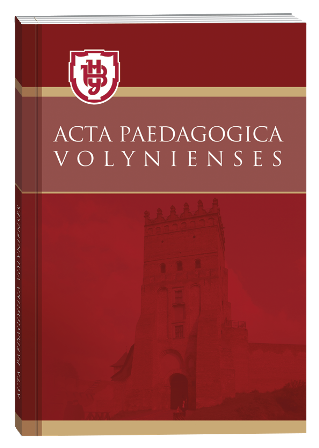МОДЕЛЮВАННЯ ПРОЦЕСУ ФОРМУВАННЯ МІЖКУЛЬТУРНОЇ КОМПЕТЕНТНОСТІ МАЙБУТНІХ ФАХІВЦІВ ПЕДАГОГІЧНОЇ ОСВІТИ ЗАСОБАМИ ІНТЕРАКТИВНИХ ТЕХНОЛОГІЙ
DOI:
https://doi.org/10.32782/apv/2023.3.3Ключові слова:
міжкультурна компетентність, інтерактивні технології, модуль, майбутні фахівці педагогічної освіти, міжкультурне спілкування.Анотація
Підготовка сучасного фахівця педагогічної освіти передбачає формування особистості готової успішно виконувати професійні завдання у сучасних соціально-економічних умовах та здатної до ефективної міжкультурної комунікації. На основі вивчення низки міжнародних нормативних актів ООН, ЮНЕСКО, Ради Європи та нормативно- правової бази України доведено важливість міжкультурної компетентності для майбутнього педагога та необхідність активного пошуку шляхів налагодження міжкультурної взаємодії в полікультурному середовищі. освітнє середовище У цьому аспекті міжкультурна компетентність стає рушійною силою розвитку особистості майбутнього педагога, здатного протистояти негативним глобальним викликам, готовому до ефективної міжкультурної взаємодії з колегами в освітньому просторі. Зроблений акцент на важливе соціокультурне значення міжкультурної компетентності в сучасному суспільстві. Проаналізовано етимологічну близькість термінів “компетенція” і “компетентність”, враховуючи сучасні вітчизняні та зарубіжнуі наукові дослідження.. У статті висвітлено питання використання інтерактивних технологій, як актуальних засобів формування та розвитку міжкультурної компетентності здобувачів вищої педагогічної освіти. Вказано на полікультурну освіту, яка у сучасному світі є важливим елементом системи вищої освіти, зазначивши, що вона є необхідною для майбутніх педагогів. Висвітлено питання професійної компетентності педагога з точки зору акмеології. Акцентовано увагу на певній сукупності знань, навичок і умінь, загальних для всіх комунікантів, для повноцінного культурного взаєморозуміння партнерів по спілкуванню з представниками інших культур в реальному поліміжкультурної комунікації У статті запропоновано структуру моделі формування міжкультурної компетентності із використання інтерактивних технологій, що набуває особливої актуальності та є відображення об’єктивних запитів суспільства щодо якісної підготовки майбутніх педагогів.
Посилання
Вітвицька С. С. Основи педагогіки вищої школи. Метод. посіб. для студ. Київ. Центр навчальної літератури. 2003. 316 с.
Кожевнікова А., Дудко Я., Голубенко Н. Формування міжкультурної компетентності сучасного вчителя як важливий чинник успішної педагогічної діяльності. Науковий вісник Мелітопольського державного педагогічного університету. Серія: Педагогіка. 2016. № 2 (17). С. 120–125.
Лодатко Є. О. (2011) Педагогічні моделі, педагогічне моделювання і педагогічне вимірювання: that is that? Педагогіка вищої школи: методологія, теорія, технології. Вища освіта України: Теоретичний та науково-методичний часопис. У 2-х т. Вип. 3 2011. Т. 1. 2011. С. 339–344.
Пометун, О. Інтерактивні методи навчання. Енциклопедія освіти. Акад. пед. наук України. К. Юрінком Інтер. 2008. 140с.
Banks J. An Introduction to Multicultural Education. Allyn&Bacon, 2008. 480 р.
Kowalczuk Larysa. Полікультурність і міжкультурна компетентність у контексті формування культури професійного мислення вчителя. Prace naukowe Akademii im. Jana Długosza w Częstochowie. t. XVII. 2015. s. 225– 244.
Kryshtanovych M., Kotyk T., Tiurina T., Kovrei D., Dzhanda H. Pedagogical and Psychological Aspects of the Implementation of Model of the Value Attitude to Health. BRAIN. Broad Research in Artificial Intelligence and Neuroscience. Vol. 11(2Sup1). 2020. Р.127-138. URL: https://www.webofscience.com/wos/woscc/full-record/ WOS:000652190600011.
Olson, C. L. & Kroeger, K. R. Global competency and intercultural sensitivity. Journal of Studies in International Education, № 5, 2001. С.116-137.
Zhai, L. & Scheer, S. D. Global perspectives and attitudes toward cultural diversity among summer agriculture students at the Ohio State University. Journal of Agricultural Education, № 45, 2004. С. 39-51.







